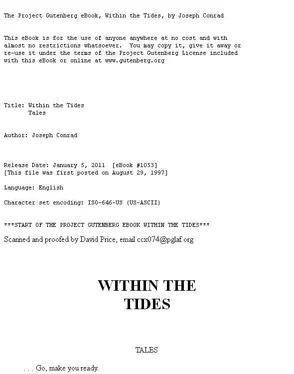Joseph Conrad - Within the Tides - Tales
Здесь есть возможность читать онлайн «Joseph Conrad - Within the Tides - Tales» весь текст электронной книги совершенно бесплатно (целиком полную версию без сокращений). В некоторых случаях можно слушать аудио, скачать через торрент в формате fb2 и присутствует краткое содержание. Год выпуска: 1997, Жанр: Старинная литература, на английском языке. Описание произведения, (предисловие) а так же отзывы посетителей доступны на портале библиотеки ЛибКат.
- Название:Within the Tides: Tales
- Автор:
- Жанр:
- Год:1997
- ISBN:нет данных
- Рейтинг книги:4 / 5. Голосов: 1
-
Избранное:Добавить в избранное
- Отзывы:
-
Ваша оценка:
- 80
- 1
- 2
- 3
- 4
- 5
Within the Tides: Tales: краткое содержание, описание и аннотация
Предлагаем к чтению аннотацию, описание, краткое содержание или предисловие (зависит от того, что написал сам автор книги «Within the Tides: Tales»). Если вы не нашли необходимую информацию о книге — напишите в комментариях, мы постараемся отыскать её.
are linked by Conrad's treatment of loyalty and betrayal. They range in setting from the Far East via eighteenth-century Spain to England. The tone shifts from the tragic inevitability of
and the pathos of
to the gothic
and the grim humour of
. The form of the stories was experimental but does not obscure Conrad's humanity or his search for moral truth.
Within the Tides: Tales — читать онлайн бесплатно полную книгу (весь текст) целиком
Ниже представлен текст книги, разбитый по страницам. Система сохранения места последней прочитанной страницы, позволяет с удобством читать онлайн бесплатно книгу «Within the Tides: Tales», без необходимости каждый раз заново искать на чём Вы остановились. Поставьте закладку, и сможете в любой момент перейти на страницу, на которой закончили чтение.
Интервал:
Закладка:
He was very deliberate; not jerky, only fragmentary; at times profane.
“That’s a rather remote connection,” I observed, approaching him.
“Connection? To Hades with your connections. It was an accident.”
“Still,” I said, “an accident has its backward and forward connections, which, if they could be set forth—”
Without moving he seemed to lend an attentive ear.
“Aye! Set forth. That’s perhaps what you could do. Couldn’t you now? There’s no sea life in this connection. But you can put it in out of your head—if you like.”
“Yes. I could, if necessary,” I said. “Sometimes it pays to put in a lot out of one’s head, and sometimes it doesn’t. I mean that the story isn’t worth it. Everything’s in that.”
It amused me to talk to him like this. He reflected audibly that he guessed story-writers were out after money like the rest of the world which had to live by its wits: and that it was extraordinary how far people who were out after money would go. . . Some of them.
Then he made a sally against sea life. Silly sort of life, he called it. No opportunities, no experience, no variety, nothing. Some fine men came out of it—he admitted—but no more chance in the world if put to it than fly. Kids. So Captain Harry Dunbar. Good sailor. Great name as a skipper. Big man; short side-whiskers going grey, fine face, loud voice. A good fellow, but no more up to people’s tricks than a baby.
“That’s the captain of the Sagamore you’re talking about,” I said, confidently.
After a low, scornful “Of course” he seemed now to hold on the wall with his fixed stare the vision of that city office, “at the back of Cannon Street Station,” while he growled and mouthed a fragmentary description, jerking his chin up now and then, as if angry.
It was, according to his account, a modest place of business, not shady in any sense, but out of the way, in a small street now rebuilt from end to end. “Seven doors from the Cheshire Cat public house under the railway bridge. I used to take my lunch there when my business called me to the city. Cloete would come in to have his chop and make the girl laugh. No need to talk much, either, for that. Nothing but the way he would twinkle his spectacles on you and give a twitch of his thick mouth was enough to start you off before he began one of his little tales. Funny fellow, Cloete. C-l-o-e-t-e—Cloete.”
“What was he—a Dutchman?” I asked, not seeing in the least what all this had to do with the Westport boatmen and the Westport summer visitors and this extraordinary old fellow’s irritable view of them as liars and fools. “Devil knows,” he grunted, his eyes on the wall as if not to miss a single movement of a cinematograph picture. “Spoke nothing but English, anyway. First I saw him—comes off a ship in dock from the States—passenger. Asks me for a small hotel near by. Wanted to be quiet and have a look round for a few days. I took him to a place—friend of mine. . . Next time—in the City—Hallo! You’re very obliging—have a drink. Talks plenty about himself. Been years in the States. All sorts of business all over the place. With some patent medicine people, too. Travels. Writes advertisements and all that. Tells me funny stories. Tall, loose-limbed fellow. Black hair up on end, like a brush; long face, long legs, long arms, twinkle in his specs, jocular way of speaking—in a low voice. . . See that?”
I nodded, but he was not looking at me.
“Never laughed so much in my life. The beggar—would make you laugh telling you how he skinned his own father. He was up to that, too. A man who’s been in the patent-medicine trade will be up to anything from pitch-and-toss to wilful murder. And that’s a bit of hard truth for you. Don’t mind what they do—think they can carry off anything and talk themselves out of anything—all the world’s a fool to them. Business man, too, Cloete. Came over with a few hundred pounds. Looking for something to do—in a quiet way. Nothing like the old country, after all, says he. . . And so we part—I with more drinks in me than I was used to. After a time, perhaps six months or so, I run up against him again in Mr. George Dunbar’s office. Yes, that office. It wasn’t often that I . . . However, there was a bit of his cargo in a ship in dock that I wanted to ask Mr. George about. In comes Cloete out of the room at the back with some papers in his hand. Partner. You understand?”
“Aha!” I said. “The few hundred pounds.”
“And that tongue of his,” he growled. “Don’t forget that tongue. Some of his tales must have opened George Dunbar’s eyes a bit as to what business means.”
“A plausible fellow,” I suggested.
“H’m! You must have it in your own way—of course. Well. Partner. George Dunbar puts his top-hat on and tells me to wait a moment. . . George always looked as though he were making a few thousands a year—a city swell. . . Come along, old man! And he and Captain Harry go out together—some business with a solicitor round the corner. Captain Harry, when he was in England, used to turn up in his brother’s office regularly about twelve. Sat in a corner like a good boy, reading the paper and smoking his pipe. So they go out. . . Model brothers, says Cloete—two love-birds—I am looking after the tinned-fruit side of this cozy little show. . . Gives me that sort of talk. Then by-and-by: What sort of old thing is that Sagamore ? Finest ship out—eh? I dare say all ships are fine to you. You live by them. I tell you what; I would just as soon put my money into an old stocking. Sooner!”
He drew a breath, and I noticed his hand, lying loosely on the table, close slowly into a fist. In that immovable man it was startling, ominous, like the famed nod of the Commander.
“So, already at that time—note—already,” he growled.
“But hold on,” I interrupted. “The Sagamore belonged to Mundy and Rogers, I’ve been told.”
He snorted contemptuously. “Damn boatmen—know no better. Flew the firm’s house-flag . That’s another thing. Favour. It was like this: When old man Dunbar died, Captain Harry was already in command with the firm. George chucked the bank he was clerking in—to go on his own with what there was to share after the old chap. George was a smart man. Started warehousing; then two or three things at a time: wood-pulp, preserved-fruit trade, and so on. And Captain Harry let him have his share to work with. . . I am provided for in my ship, he says. . . But by-and-by Mundy and Rogers begin to sell out to foreigners all their ships—go into steam right away. Captain Harry gets very upset—lose command, part with the ship he was fond of—very wretched. Just then, so it happened, the brothers came in for some money—an old woman died or something. Quite a tidy bit. Then young George says: There’s enough between us two to buy the Sagamore with. . . But you’ll need more money for your business, cries Captain Harry—and the other laughs at him: My business is going on all right. Why, I can go out and make a handful of sovereigns while you are trying to get your pipe to draw, old man. . . Mundy and Rogers very friendly about it: Certainly, Captain. And we will manage her for you, if you like, as if she were still our own. . . Why, with a connection like that it was good investment to buy that ship. Good! Aye, at the time.”
The turning of his head slightly toward me at this point was like a sign of strong feeling in any other man.
“You’ll mind that this was long before Cloete came into it at all,” he muttered, warningly.
“Yes. I will mind,” I said. “We generally say: some years passed. That’s soon done.”
He eyed me for a while silently in an unseeing way, as if engrossed in the thought of the years so easily dealt with; his own years, too, they were, the years before and the years (not so many) after Cloete came upon the scene. When he began to speak again, I discerned his intention to point out to me, in his obscure and graphic manner, the influence on George Dunbar of long association with Cloete’s easy moral standards, unscrupulously persuasive gift of humour (funny fellow), and adventurously reckless disposition. He desired me anxiously to elaborate this view, and I assured him it was quite within my powers. He wished me also to understand that George’s business had its ups and downs (the other brother was meantime sailing to and fro serenely); that he got into low water at times, which worried him rather, because he had married a young wife with expensive tastes. He was having a pretty anxious time of it generally; and just then Cloete ran up in the city somewhere against a man working a patent medicine (the fellow’s old trade) with some success, but which, with capital, capital to the tune of thousands to be spent with both hands on advertising, could be turned into a great thing—infinitely better-paying than a gold-mine. Cloete became excited at the possibilities of that sort of business, in which he was an expert. I understood that George’s partner was all on fire from the contact with this unique opportunity.
Читать дальшеИнтервал:
Закладка:
Похожие книги на «Within the Tides: Tales»
Представляем Вашему вниманию похожие книги на «Within the Tides: Tales» списком для выбора. Мы отобрали схожую по названию и смыслу литературу в надежде предоставить читателям больше вариантов отыскать новые, интересные, ещё непрочитанные произведения.
Обсуждение, отзывы о книге «Within the Tides: Tales» и просто собственные мнения читателей. Оставьте ваши комментарии, напишите, что Вы думаете о произведении, его смысле или главных героях. Укажите что конкретно понравилось, а что нет, и почему Вы так считаете.












